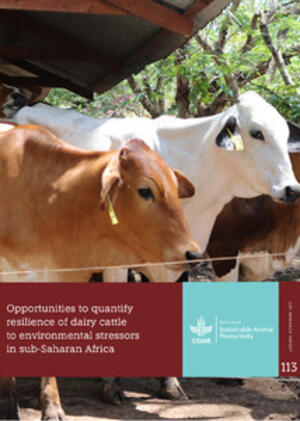
Website and App development
LIPS-ZIM Project
The Livestock Production Systems in Zimbabwe (LIPS-ZIM) project is being implemented in six provinces in Zimbabwe. International Livestock Research Institute (ILRI) is partnering with, International Maize and Wheat Improvement Center (CIMMYT), French Agricultural Research Centre for International Development (Cirad) and University of Zimbabwe (UZ). The project aims to increase the adoption of climate relevant innovations in livestock-based production systems and improve surveillance and control of livestock diseases in Zimbabwe’s agro-ecological regions IV & V.

On-farm Feed Advisor
The On-farm Feed Advisor helps extension staff to advise farmers on how to balance their animals’ diet by matching nutrients and production in the feed offered, based on the animal body weight, milk production and stage of pregnancy. The application selects the cheapest locally available feeds to bridge the nutritional gap. The results are given in the form of an advice memo with information including cost of feeding and additional income before and after balancing the diet.

eWeigh
eWeigh is a simple app that helps farmers estimate the live weight of their cattle
- Estimate the liveweight (LW) of cattle using a heart-girth measurement.
- Easy farmer registration
- Register and track your cattle's weight
- Calculate food rations for best cattle health

ILRI Passport
ILRI Passport is an ad-on mobile application for ILRI Security Unit Visitor Management System.
- Your personal P.A.
- Your data in your hands
- Get notified
- Priority check-in
- Seamless integration with your security and reception desks
- Calendar integration

ILRI Herd Manager
This app was created to support a herd health research project within which it was important to have a tools that could easily capture details of animal health, productivity and movements. The project has the title HEARD (also the name of the app) and is led in Ethiopia by the International Livestock Research Institute (ILRI). The app was commissioned by ILRI as part of this project but a condition of their support was that the app should be made available on an open source (GNU GLP license) basis. This fits well with the ethos for the broader D3F project within which the app is situated as a key objective of that project is to provide open source tools to improve animal disease diagnosis and reporting in resource limited areas.

Dairy animal catalogue
This animal catalogue is a key output meant to showcase top-ranked bulls and cows that would be used in future genetic improvement to improve farmers animals.

IBLI Premium Insurance Calculator
Index Based Livestock Insurance calculator helps you to calculate how much you need to pay and how much subsidy is provided to you based on the number of cattle you have.

IBLI M-learning app
Learning IBLI is an interactive multilingual (currently supporting Afan Orommo and Swahili) android application that provides assessment and video tutorial on Index Based Livestock Insurance. It contains Pre, Post and Post-Post assessment on IBLI. Between Pre and Post assessment, there is video tutorial module containing 7 courses with in-video multiple choice continuous assessment quizzes.

The Rangelands Initiative
The Rangelands Initiative is composed of a global component and three regional components. The global component incorporates key global agencies, organisations and research institutes working on land issues in rangelands and with rangelands users. The regional components include local and international NGOs, research organisations and pastoralist or land rights networks.

The Genomic Reference Resource for African Cattle
The Genomic Reference Resource for African Cattle is an initiative of the dairy genomics program of the Centre for Tropical Livestock Genetics and Health and African partners, and with support from African Union Inter-African Bureau for Animal Resources (AU-IBAR).

ADGG data platform
Africa Dairy Genetic Gains (ADGG) is an international Livestock Research Institute (ILRI) – led investment by the Bill and Melinda Gates Foundation (BMGF) that is developing and testing a multi-country genetic gains platform. ADGG data platform contains data on farms and dairy animals reared in specified countries of Eastern Africa. The database has access control logic features for different users based on their role and permissions.

CGIAR AMR Hub
The CGIAR Antimicrobial Resistance Hub, led by the International Livestock Research Institute (ILRI), applies a One Health approach to support the efforts of low- and middle-income countries (LMICs) in controlling agriculture-associated AMR risks, through promoting and facilitating transdisciplinary partnerships. The recently adopted CGIAR AMR strategy recognizes the need for evidence on links between agriculture (crops, livestock and aquaculture) and public health outcomes. Based on evidence generated, the hub develops solutions that are locally relevant and applicable, while being adaptable to other contexts.

One Health Observatory
The COHESA project set up three domains of focus, One Health governance, One Health education and One Health delivery. The current emphasis is on governance and education cover the 12 COHESA countries.
Under the guidance of the International Livestock Research Institute (ILRI), in partnership with The French Agricultural Research Centre for International Development (CIRAD) and ISAAA-AfriCenter (International Service for the Acquisition of Agri-Biotech Applications), COHESA aims to build society-wide One Health capacity, able to develop and adapt solutions to the various emerging and on-going One Health threats. It is delivered by national partners who within each country tailor the COHESA activities to meet the local needs and priorities.
This project receives funding from the European Union Organization of African, Caribbean, and Pacific States (OACPS) Research and Innovation Programme as part of the African, Caribbean, and Pacific-European Union (ACP-EU) initiative. Additionally, it receives co-funding support from ILRI, CIRAD, and The University of Pretoria. These collaborative efforts empower the One Health Observatory and reinforce the shared dedication to shaping a healthier, more sustainable future for Eastern and Southern Africa.

Want a Website or App Developed?
It's simple!





